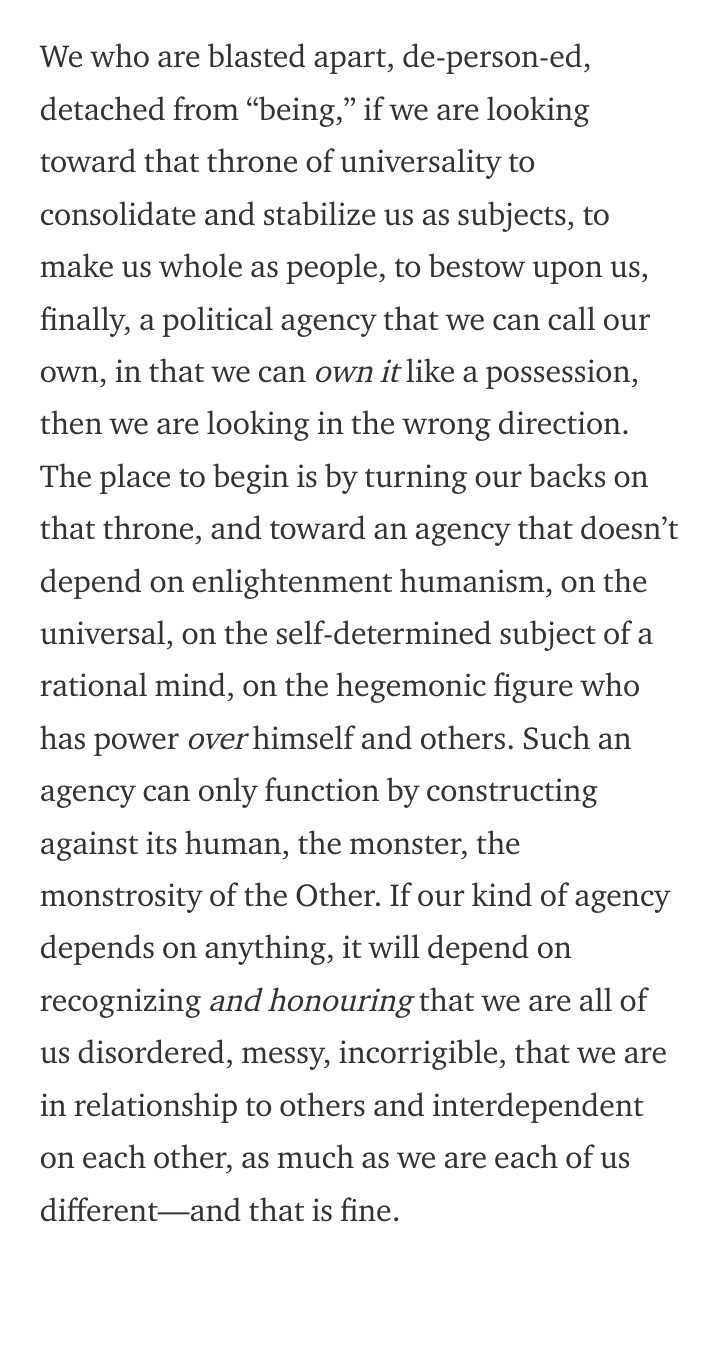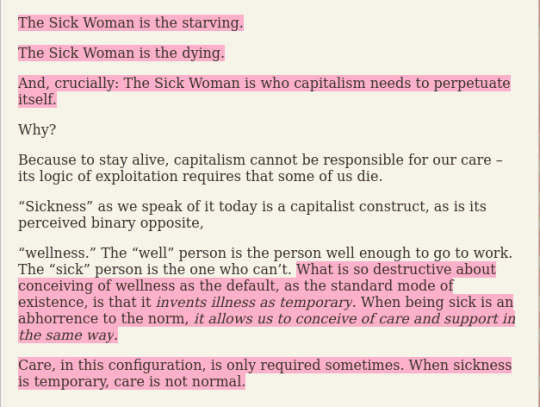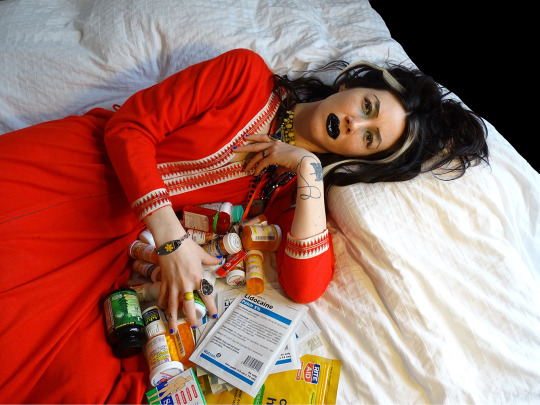#Johanna hedva
Explore tagged Tumblr posts
Text

Johanna Hedva, "In Defence of De-persons" [ID in ALT]
253 notes
·
View notes
Text








Bad Road Leah Lakshmi Piepzna-Samarasinha / Drawing from Anatomy by John Fotherby 1729 / sick4sick torrin a greathouse / Sick Woman Theory 2020 Johanna Hedva / The End Halsey / Parable of the Sower Octavia Bulter / I'm watching the episode of She-Ra where Glimmer gets sick Ariana Monet / Bad Road Leah Lakshmi Piepzna-Samarasinha
#web weave#web weaving#chronic illness#disability#poetry#leah lakshmi piepzna samarasinha#halsey#johanna hedva#ariana monet#octavia butler#torrin a greathouse
33 notes
·
View notes
Text


JOHANNA HEDVA, photographed by Pamila Payne
36 notes
·
View notes
Text
Johanna Hedva, author of Sick Woman Theory



“Solidarity is a slippery thing. It’s hard to feel in isolation. In bed, in pain, I started to think about the kind of solidarity in which I could participate as someone stuck at home, alone. I started to think about what modes of protest are afforded to sick and disabled people at all.”

#johanna hedva#sick woman theory#disability#protest#blm#chronic illness#korean American#activist#bed bound#disabled#ableism#activism#Asian theorist
10 notes
·
View notes
Text
In crip community, interdependence, support, and mutual aid are held closer than anything else, but we also understand and know in our bones that to be crip and political about it, one must keep one’s fury and surrender in equal balance. To be crip and political about it is to redefine what being dependent means, how we understand our autonomy at all—which means it requires an unflinching look at how we are so much more fragile and reliant than we think we are, or might like to be, and how bodies are so much more bizarre and defective than might at times be bearable, and how much fucking suffering we must endure, and how close we are to death, because society has put us there, and because our bodies can sometimes feel like they put us there too. All the ways we cannot do something, all the ways we won’t be able to do something—what sort of political dreams can come from this as a starting place?
— How to Tell When We Will Die: On Pain, Disability, and Doom, Johanna Hedva
7 notes
·
View notes
Text
Adulthood has sobered me on the actual political impact of rebelliousness. I know that flipping off cop cars doesn’t actually do anything to dismantle oppression, but it sure as fuck still feels good. It will always thrill me to shout ‘Fuck you!’ to teachers, parents, bosses. To spit on the door of a bank, to crush a cigarette into the face on a politician’s sign. What a feeling of liberation to go to my high-school campus on a weekend and piss on the office door of the chemistry teacher who was giving me a D-. When I see young goths and punks sitting in piles of each other outside drugstores, smoking their clove cigarettes in their Dr. Martens and writing lyrics on their fragile skin in ballpoint pen, I will always smile and nod and want to lean over and tell them to try to stay romantic about all that acrimony for as long as they can, because the romance of it is what will help the most.
—Johanna Hedva, from “‘They’re Really Close to My Body’: A Hagiography of Nine Inch Nails and Their Resident Mystic Robin Finck” (The White Review, March 2020)
#quotations#johanna hedva#rebellion#this whole entire piece is so good#i saved so many quotes from it#but this is the one i ultimately decided to post#but it was so hard to choose#recently read
59 notes
·
View notes
Text

an excerpt from "Sick Woman Theory" by Johanna Hedva
30 notes
·
View notes
Text
The fuck vs. be configuration of rock-star fandom has never made much sense to me. Rock music elementally is about how wanting to fuck someone converges dangerously and deliciously with wanting to be someone. The maxim is meant to explain how much desire has accumulated around the band, not only in terms of how we lust after them, but in terms of something that cuts closer to how we desire ourselves. Audiences, as much as they are fans of particular figures, want to see themselves reflected back through those figures. All good rock stars have a bewitching power that goes straight through the sternum and touches something quivering and central in the gut. It’s the feeling that you can find yourself, or who you want to be, in one of the musicians onstage. In psychoanalysis, this would be called projection, the transfer of your desires on to another person. But a more ancient way of explaining it is through the spiritual idea of communion, which has to do with an unspeakable sense of connection with something that both lives in your body and beyond it. Watching a rock star onstage, using their body and face to express something interior now made into flesh and sound, can show you all kinds of things: where the edges of your body are, and how they can be dissolved; how you can feel connected to other bodies around you, and also to something you can’t see or touch, but which you can hear and feel. It can help you understand what you feel, by affording you the sense of recognition: you can hear your feelings and thoughts emerge from someone else. But it also shows you what is possible to feel, by letting you see what someone else has done with those same feelings. This is what connects you to that thing that is both in your own body and beyond it. Because connection has to do with desire, all of this can point toward how you want to feel, which is to say, how to get to the self you want to become. You can do that. You can be that.
—Johanna Hedva, from “‘They’re Really Close to My Body’: A Hagiography of Nine Inch Nails and Their Resident Mystic Robin Finck” (The White Review, March 2020)
#quotations#johanna hedva#rock stars#fandom#yes#YESSSS#do you wanna do them or be them? or both?#finally someone gets it#connection#desire#identity#all of this
21 notes
·
View notes
Text
Quotes I've saved for some reason #65
Privilege is simply being able to understand oneself in terms of one's individuality, rather than how one is interdependent, formed in relationship, and deeply intertwined with systems of power, which is to say, intertwined with sociality and politics. And to be private about oneself, if we think in Arendtian terms, is not to have to be political. For a lot of us, we are only ever seen through the systems of identity and sociality ascribed to us—our race, class, gender, disability, etc—rather than who we are as "individuals."
– Johanna Hedva, On hell (conversation with Gabrielle Welsh)
2 notes
·
View notes
Text
parasocial relationship with niche writer guitarist poet artist theorist activist playwright astrologer high priestess of the void doom metal time wizard medieval mysticism truther johanna hedva . love their essays so much i want to read minerva miscarriage of the brain at some point
6 notes
·
View notes
Text
I forgive myself for my impulse to call for the ousting of the Healthy White & Propertied Male from the throne of the universal subject position that he’s sat in for so long. The direction to go, we are conditioned to believe, is up. Like birds trapped in a room. But it’s the throne itself that we must tear down: the throne on which the universal sits. That there is a throne at all is the problem—regardless of who sits in it. We don’t need to go up. Let’s look to the windows, the way out.
Johanna Hedva, "In Defence of De-persons"
149 notes
·
View notes
Text
“All ghosts are queer.”
- Johanna Hedva
0 notes
Text
youtube
0 notes
Text
Today, I discovered Sick Woman Theory by Johanna Hedva.
Portrait of Johanna Hedva. Photograph by Pamila Payne. Styled by Rhi Jade.

I share it with you here:
https://johannahedva.com/SickWomanTheory_Hedva_2020.pdf
“Sick Woman Theory maintains that the body and mind are sensitive and reactive to regimes of oppression – particularly our current regime of neoliberal, white-supremacist, imperial-capitalist, cis-hetero-patriarchy. It is that all of our bodies and minds carry the historical trauma of this, that it is the world itself that is making and keeping us sick...
The Sick Woman is an identity and body that can belong to anyone denied the privileged existence – or the cruelly optimistic promise of such an existence – of the white, straight, healthy, neurotypical, upper and middle-class, cis- and able-bodied man who makes his home in a wealthy country, has never not had health insurance, and whose importance to society is everywhere recognized and made explicit by that society; whose importance and care dominates that society, at the expense of everyone else.
The Sick Woman is anyone who does not have this guarantee of care.
The Sick Woman is told that, to this society, her care, even her survival, does not matter...
And, crucially: The Sick Woman is who capitalism needs to perpetuate itself.
Why?
Because to stay alive, capitalism cannot be responsible for our care – its logic of exploitation requires that some of us die...
The most anti-capitalist protest is to care for another and to care for yourself. To take on the historically feminized and therefore invisible practice of nursing, nurturing, caring. To take seriously each other’s vulnerability and fragility and precarity, and to support it, honor it, empower it. To protect each other, to enact and practice community. A radical kinship, an interdependent sociality, a politics of care...
Because, once we are all ill and confined to the bed, sharing our stories of therapies and comforts, forming support groups, bearing witness to each other’s tales of trauma, prioritizing the care and love of our sick, pained, expensive, sensitive, fantastic bodies, and there is no one left to go to work, perhaps then, finally, capitalism will screech to its much-needed, long-overdue, and motherfucking glorious halt.“
PHOTO CREDITS:
https://topicalcream.org/features/sick-woman-theory/ (Portrait of Johanna Hedva. Photograph by Pamila Payne. Styled by Rhi Jade).
0 notes
Text
Becoming disabled, for me, was an education in many things, but sometimes I think it was elementally about relearning how to understand dependency, and how disability makes it impossible to ignore that we are ontologically dependent, knotted into each other and everything. It was an education in how time and debt are entangled, with how disability troubles capitalism’s unholy marriage of time and money, putting a person again and again into the condition of financial and bodily insolvency, where there is never enough time and nothing can be paid back. It was learning how to count, hold, wait for, and let go of different kinds of time—and the word “time” could here be replaced with “debts,” and the meaning wouldn’t change.
— How to Tell When We Will Die: On Pain, Disability, and Doom, Johanna Hedva
7 notes
·
View notes